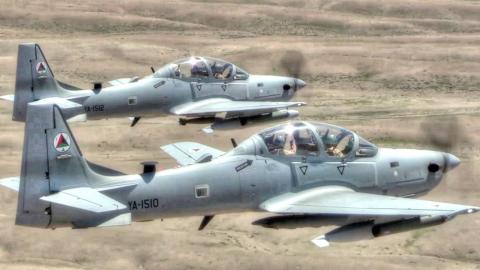
The Resource Centre for Human Rights & Civic Education (CHRICED), a non-government group said investment in policies that will make it unattractive for young people to join Boko Haram and other violence inclined groups, instead of piling up arms and ammunitions is a better strategy to fight the the problem of insurgency and other crimes in the country.
The group said this in reaction to ongoing controversies over the bid by the Federal Government to purchase Tucano Aircraft to fight Boko Haram.
The group, in a statement released on April 29 by its Executive Director, Comrade Dr. Ibrahim M. Zikirullahi said, “The Resource Centre for Human Rights & Civic Education (CHRICED) has closely followed the ongoing controversy over the approval of $496m (four hundred and ninety-six million United States Dollars) funds by President Muhammadu Buhari for the purchase of Tucano aircrafts to fight the Boko Haram insurgency and other national security threats facing the country.

"Beyond the debate about the appropriateness of the President’s anticipatory spending before approval by the legislature, CHRICED is seriously concerned about the long term efficacy and sustainability of the strategy of acquiring more military hardware and armament to fight insecurity. We make no mistake about the fact that the people these weapons will be used to mow down, are in the end, citizens of Nigeria.
"CHRICED is also clear about the fact that the root cause of the insurgency is poor governance, which made it possible for unemployed and disaffected youths to be brainwashed and won into the camps of terrorists.
"To get to the root of the insurgency therefore, critical questions need to be asked about how young Nigerians in their prime got convinced by the hateful ideology of terror groups to the point of joining such groups.
"To address the problem therefore, more weapons and military hardware is not the answer. The answer is in a robust programme of outreaches, which would disrupt the support base of the insurgents, and cut off their recruitment sources.”
The group said its research revealed that the insurgency ‘is being sustained by the recruitment of disaffected, frustrated and marginalized youth population into the camps of extremists’ and therefore, ‘any serious attempt to end the insurgency must explore innovative ways to reach out to this young population, which is amenable to recruitment to the camp of extremists.’
According to the group, “No amount of weapons, military hardware or specialized aircrafts would win this fight, if there is no corresponding strategy to counter the ideas of the extremists and cut off sources of their recruitment of impressionable young minds.
" Subsequently, after the authorities win the battle at the level of ideas, which fuel the insurgency, it must move quickly to take on the monster of unemployment. This is critical because when young people in their prime have no work to do, the masterminds behind terrorism and criminal activities will reach out to such youths and use them to achieve their nefarious goals.
This reality is true across the country, whether it is the Boko Haram problem in the North East, the militancy in the Niger-Delta or the drumming up of separatist sentiments as would be seen in the South East IPOB.”
The group therefore urged the federal government to adopt bold, sustainable and innovative policies to get as many youths as possible back to work: "such a bold policy decision would unleash the energies of Nigeria’s youth population, and create thousands of direct and indirect jobs in local communities across the country.
"Besides, it will address the rural-urban drift, which is responsible for the tension, inequality, informality and marginality, which have become constant features of Nigeria’s urban centres.’
“In the light of these realities therefore, CHRICED urges the Federal Government to rethink its strategy to curb insecurity by making it much more holistic.
"Security is no longer defined by the amount of armament, bullets and ammunition a country can acquire.
"Rather it is defined by the broad concept of human security, which involves a preventive approach to curbing the kinds of security problems that have dogged the country. The earlier the nation adopts this approach, the better for its survival.”